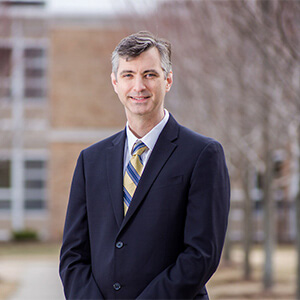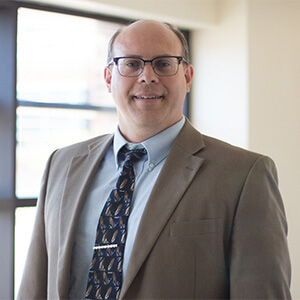
Lutheran schools prepare students for a fruitful life today and an everlasting one for eternity. They teach truth, God's Word, and the good news of salvation in a world of lies, noise, and despair. The reason for Lutheran education is clear. The way in which Lutheran schools are successfully organized and run is perhaps less so.

Two leaders from Concordia University Wisconsin and Ann Arbor strive to inspire Lutheran schools with new possibilities, approaches, and incremental improvements with their book, “Imagine the Possibilities: Conversations on the Future of Christian Education.” Through their writing, Dr. Bernard Bull, vice provost for Curriculum and Academic Innovation, and Dr. James Pingel II, dean of the School of Education, invite readers to travel with them around the world, visiting different Lutheran schools that are growing, innovating, and thriving in a culture that challenges Christian education.
On Oct. 16, Concordia will host an Author Talk event where Bull and Pingel will present their book and answer questions from attendees. The event will be from 7:30-9:15 a.m. in the Lake Shore room on Concordia’s campus, 12800 N. Lake Shore Drive, Mequon. The cost per person is $5 and includes breakfast and a copy of the authors’ book.
Those interested are asked to register by emailing Cynthia.Guth@cuw.edu or calling 262-243-4342. Those who aren’t able to attend can pick up a copy of the book here.
In anticipation of the event, Bull and Pingel sat down to answer a few questions about their work.

What led you to write this book?
Bull: One of the biggest challenges that I’ve run into as I’ve visited different Lutheran schools throughout the world is what it takes for them to survive and stay faithful to their Lutheran
heritage. Our Lutheran schools are facing all sorts of challenges. Sometimes the challenges are financial. Other times they are about finding a way to reach and serve new populations of students while staying close to their mission. We hope this book will serve as a resource in through the examples it provides of schools who are finding innovative ways of tackling these big questions.
Pingel: As a former Lutheran High School administrator, I had no problem coming up with innovative ideas or listening to others who offered innovative ideas on how to implement change, enhance programs, and better a school. What I needed help with is implementing the change. Everyone liked to talk change, but nobody wanted to work for the change. So what I like about this book is it not only shows Lutheran leaders the possibilities in the world of education, but we provide compelling stories, concepts, and strategies on how to implement the change in doable and realistic ways. Sometimes little tweaks propel big change.
Dr. Bull, you’ll soon be leaving Concordia to take on a new position as president of Goddard College in Vermont, a school that isn’t afraid of innovative methods. What compelled you to take the position, and what example might Goddard provide for others?
Bull: Goddard was an experimental college from the beginning. It was a college that was created with the belief that students should have a voice and choice, and that these are part of equipping them to be active and engaged in the world. As an example, they don’t use letter grades. They instead have a narrative feedback system that they use. This type of approach really resonates with a lot of my own work about what a 21st-century education should look like and so it was largely appealing to me for that reason. I think it serves as a model for others as well. This is the kind of story higher education needs right now. And there are a lot of examples of Lutheran schools that are venturing into this same kind of model as well. In fact, we tell the story of at least one of them in our book.
Give us a taste of the case studies readers can expect to learn more about when they pick up a copy of the book.
Pingel: We ended up including 11 case studies in the book, but I would love to do a sequel. The list of possibilities and different approaches to Lutheran education are innumerable. We ultimately picked these 11 to represent a variety of grade levels, geographic locations, uniqueness, and by the fact that through our research, others in our LCMS system noticed the specialness of each of these approaches and schools.
Lights Academy at Lutheran High School in Parker, Colorado is a very succinct example of a simple, doable, but profoundly innovative way to add value to a traditional Lutheran high school. The model is basically this: create your own leadership academy, create your own school within your school. Everyone can do this without radically changing the current structure and approach of the school as a whole and it can add tremendous value.
Are there any parts of the book that you think might surprise readers?
Bull: I think it might surprise readers to learn how many different ways there are to be faithful to a Lutheran understanding of education while being able to be financially viable. In fact, we purposely order various styles next to each other in the book. There’s a classical school placed next to a more project-based school, for example. Some people might view those as incredibly different, but when you look under the surface, you realize that they are inspired by the same Lutheran mission.
At Concordia, we are ever-striving to prepare our students in “mind, body, and spirit for service to Christ in the Church and world.” How does your writing hit on this theme, and how might it seek to similarly challenge or equip readers?
Pingel: Lutheran schools, and the students which attend them, are the future of our Church. They are one of our greatest mission fields. These students and families are coming to us! We must be ready to prepare students for service to Christ and the Church. Just like many of these school leaders, I hit the pillow every night asking the same question: Am I serving God or am I serving man? If I can answer “God,” flawed sinner that I am, I sleep well knowing that the Holy Spirit is working on others.
Bernard Bull is vice provost of Curriculum and Academic Innovation, chief innovation officer, and associate professor of education at Concordia University Wisconsin. He holds degrees in history, education, humanities, and instructional technology. He is author and editor of multiple books, including: The Pedagogy of Faith, What Really Matters: Ten Critical Issues in Contemporary Education, Missional Moonshots: Insight and Inspiration in Educational Innovation, Digitized: Spiritual Implications of Technology, Adventures in Self-Directed Learning: Nurturing Learner Agency and Ownership, and Imagine the Possibilities. Bernard’s work focuses upon the critical analysis of futures and emerging trends in education, educational innovation and entrepreneurship, and the intersection of education and digital culture. He writes about these and related themes at etale.org and is also host of the MoonshotEdu Show podcast.
James Pingel II is School of Education dean and associate professor of education at Concordia University Wisconsin and has various other positions within the School of Education since his full-time arrival in 2013. Prior to Concordia, he previously served as head of school at Mayer Lutheran High School and executive director of Sheboygan Area Lutheran High School. He holds a PhD from Cardinal Stritch University in educational leadership, an MA from CUW in educational administration, and an MA from Marquette University in early American history. He is author of multiple books, including: Confidence and Character: The Religious Life of George Washington and One Team One Spirit: Inspiration for the Christian Coach.
— This story is written by Kali Thiel. Kali was Director of University Communications until April, 2025.
If this story has inspired you, why not explore how you can help further Concordia's mission through giving.